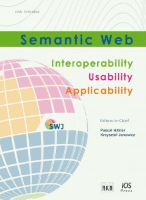
Semantic Web
Scope & Guideline
Exploring the Depths of Semantic Web Applications
Introduction
Aims and Scopes
- Knowledge Graphs and Ontologies:
The journal emphasizes the creation and management of knowledge graphs and ontologies, which serve as foundational elements for representing and organizing semantic data. - Semantic Data Integration and Interoperability:
Research focuses on methodologies and frameworks that enable the integration of heterogeneous data sources, ensuring seamless interoperability among different systems and platforms. - Semantic Querying and Reasoning:
The exploration of querying languages such as SPARQL and reasoning mechanisms to enhance data retrieval and inference capabilities within semantic data environments. - Applications of Semantic Technologies in Various Domains:
The journal covers diverse applications of semantic technologies, including healthcare, cultural heritage, industrial engineering, and environmental monitoring, showcasing their potential to solve real-world challenges. - Privacy and Ethical Considerations in Semantic Web:
A growing focus on the implications of semantic technologies on privacy and data governance, particularly in relation to compliance with regulations like GDPR.
Trending and Emerging
- Integration of AI and Semantic Technologies:
There is a rising trend in the integration of artificial intelligence techniques with semantic web technologies, enhancing capabilities such as knowledge graph reasoning and semantic data analysis. - Privacy-Preserving Semantic Data Management:
Emerging research focuses on privacy-preserving techniques within semantic data management, addressing critical concerns in data governance and compliance with regulations like GDPR. - Industrial Applications of Semantic Technologies:
A growing number of publications are dedicated to the application of semantic technologies in industrial contexts, particularly in Industry 4.0, highlighting their role in improving data quality and operational efficiency. - Dynamic Knowledge Graphs and Real-Time Data Processing:
Research on dynamic knowledge graphs and methodologies for real-time data processing is gaining traction, reflecting the need for more responsive and adaptable semantic solutions. - Health Data Management and Semantic Technologies:
The intersection of health data management and semantic technologies is increasingly prominent, focusing on enhancing data interoperability and transparency in healthcare systems.
Declining or Waning
- Traditional Data Formats and Rigid Structures:
There has been a noticeable decrease in research focused on traditional data formats and rigid data structures, as the community increasingly embraces more flexible and interconnected approaches to data representation. - Basic Ontology Development without Application:
Research that focuses solely on the development of ontologies without clear application contexts or use cases appears to be declining, as the emphasis shifts towards the practical application of ontologies in specific domains. - Static Semantic Web Technologies:
Papers discussing static or inflexible semantic web technologies are less common, indicating a trend towards dynamic, adaptable solutions that can evolve with changing data landscapes. - General Surveys on Semantic Web:
General surveys and reviews of semantic web technologies have decreased in favor of more targeted studies that address specific applications or case studies, reflecting a move towards more actionable research.
Similar Journals
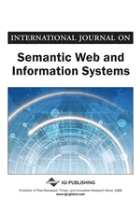
International Journal on Semantic Web and Information Systems
Exploring the Intersection of Technology and Knowledge.International Journal on Semantic Web and Information Systems, published by IGI Global, stands as a premier outlet for research in the realm of Semantic Web technologies and information systems. With a commitment to advancing knowledge and innovation, the journal is recognized for its influential contributions, evident from its prestigious Q1 rankings in both Computer Networks and Communications and Information Systems categories as of 2023. Catering to the high demands of the academic community, the journal provides a platform for interdisciplinary dialogue, showcasing cutting-edge research, methodologies, and applications that underpin the evolving landscape of information systems. Researchers and professionals can stay informed about the latest trends, best practices, and transformative technologies shaping the Semantic Web. Although it does not offer open access, the journal maintains rigorous peer-review standards to ensure quality and relevance, making it an essential resource for anyone dedicated to pushing the boundaries of knowledge in this dynamic field.
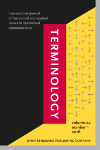
Terminology
Empowering Scholars with Insightful Terminology DiscussionsTerminology is a highly regarded journal published by John Benjamins Publishing Co, focusing on the multidisciplinary fields of communication, library and information sciences, and linguistics. Since its inception, the journal has provided a platform for rigorous research and innovative discussions surrounding the theory and practice of terminology, shedding light on its significance in effective communication and knowledge organization. With its Q2 ranking in the 2023 quartiles for communication and linguistics, and an impressive 78th percentile ranking in language and linguistics according to Scopus, Terminology stands as an influential resource for scholars and practitioners alike. Although not an open access journal, it is committed to enhancing the visibility and dissemination of critical academic work. The journal's comprehensive scope includes empirical studies, critical reviews, and theoretical explorations from 1994 to 2024, making it a vital resource for researchers, professionals, and students seeking to advance their understanding of linguistic practices and terminological challenges in an increasingly interconnected world.
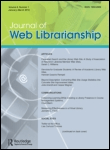
Journal of Web Librarianship
Shaping the Future of Libraries through TechnologyWelcome to the Journal of Web Librarianship, an esteemed publication dedicated to the evolving landscape of library science and information technology. Published by Routledge Journals, Taylor & Francis Ltd, this journal serves as a vital platform for researchers and professionals to share innovative practices, methodologies, and research findings in the fields of Library and Information Sciences and Computer Science Applications. With an impressive impact factor reflected in its 2023 rankings—Q1 in Library and Information Sciences and Q2 in Computer Science Applications—the journal is well-positioned to influence the discourse and development within these disciplines. Since its inception in 2007, the Journal of Web Librarianship has continually contributed to the academic dialogue, ensuring a comprehensive understanding of the critical role that web technologies play in library services. Though it is not an open-access journal, it remains an invaluable resource for those dedicated to advancing the practice and theory of web librarianship. Join us in exploring the intersections of information and technology as we work towards a more informed society.
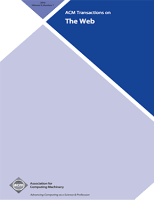
ACM Transactions on the Web
Transforming Ideas into Web SolutionsACM Transactions on the Web is a highly regarded journal published by the Association for Computing Machinery (ACM), focusing on the vast and evolving field of web technologies and their applications. With an impact factor that places it in the Q2 quartile of the Computer Networks and Communications category for 2023, this journal ranks #154 out of 395 in its discipline, showcasing its significance in advancing research and knowledge in the domain. Since its inception in 2007 and continuing through 2024, the journal has been dedicated to publishing original research that contributes to all aspects of web-based systems, applications, and services. ACM Transactions on the Web provides an essential platform for scientists, engineers, and practitioners engaged in web research, offering insights into cutting-edge methodologies and emerging technologies. Readers will appreciate the depth and diversity of articles, which encompass both theoretical and applied research, as well as reviews and case studies. The journal's commitment to quality and rigor makes it a valuable resource for anyone invested in the future of web technologies.
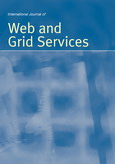
International Journal of Web and Grid Services
Exploring the nexus of technology and collaboration.International Journal of Web and Grid Services, published by INDERSCIENCE ENTERPRISES LTD, is a distinguished platform for innovative research in the realms of Web Services, Grid Computing, and Distributed Systems. Established in 2005, the journal has consistently provided a forum for groundbreaking studies, catering to the evolving needs of academia and industry professionals alike. As of 2023, it is positioned in the Q3 quartile in both Computer Networks and Communications and Software, showcasing a notable impact within the field. Researchers will find this journal instrumental in disseminating knowledge, driving advancements, and fostering collaboration in the rapidly changing technological landscape. Although it currently does not offer open access options, its commitment to high-quality peer-reviewed content ensures that it remains a vital resource for those seeking to stay at the forefront of web and grid services research. With an audience comprising both seasoned scholars and emerging professionals, the International Journal of Web and Grid Services continues to be pivotal in shaping ongoing discourse and innovation.

Big Data Mining and Analytics
Unlocking Insights, Transforming DataBig Data Mining and Analytics, published by TSINGHUA UNIVERSITY PRESS, stands at the forefront of interdisciplinary research in the fields of Artificial Intelligence, Computer Networks and Communications, Computer Science Applications, and Information Systems. With an impressive Q1 ranking in multiple categories as of 2023, this journal serves as a critical platform for researchers and professionals eager to explore innovative techniques and methodologies related to big data analytics. Since its transition to Open Access in 2018, Big Data Mining and Analytics has aimed to increase the visibility and accessibility of its cutting-edge research, making permanent strides in the global academic landscape. Housed in Beijing, China, and actively embracing the converged years from 2018 to 2024, the journal aims to cultivate a rich discourse on emerging trends and applications, ensuring its relevance in a rapidly evolving technological environment. Join a vibrant community of scholars dedicated to advancing the frontiers of knowledge in big data.

Data Intelligence
Driving the Future of AI and Computer Science ApplicationsData Intelligence, published by MIT PRESS, is an influential open-access journal dedicated to advancing knowledge within the intersecting fields of Artificial Intelligence, Computer Science Applications, and Information Systems. Since its inception in 2019, it has rapidly established itself as a leading academic platform, achieving impressive rankings—including Q2 in its principal categories for 2023—demonstrating its impact and relevance in these dynamic fields. With an E-ISSN of 2641-435X, Data Intelligence aims to bridge theoretical research and practical applications, providing a venue for scholars and practitioners to disseminate innovative research and ideas. The journal's commitment to open access ensures that cutting-edge research is accessible to a broad audience, fostering collaboration and knowledge sharing among the global community of researchers, professionals, and students. Located in Cambridge, MA, Data Intelligence continues to pave the way for transformative insights in the realm of data-driven technologies through its rigorous peer-reviewed content and a wide array of interdisciplinary perspectives.
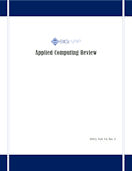
Applied Computing Review
Bridging Research and Real-World ApplicationsApplied Computing Review is a prominent academic journal published by the Association for Computing Machinery (ACM), an esteemed organization known for advancing the computing profession. Focusing on the intersection of practical applications and theoretical foundations, this journal serves as a vital platform for disseminating research in the field of applied computing, facilitating knowledge sharing among researchers, professionals, and students alike. With an ISSN of 1559-6915, the journal encompasses a wide array of topics including software engineering, data analytics, and application development, addressing current trends and challenges in the industry. Although it does not offer open access, its rigorous peer-review process ensures high-quality publications that significantly contribute to the discipline. Positioned within a competitive landscape, Applied Computing Review is dedicated to fostering innovation and providing insightful perspectives that inspire further research, thereby solidifying its importance in the field of applied computing.

Journal of Web Engineering
Pioneering Research in Computer Networks and CommunicationsThe Journal of Web Engineering, published by RIVER PUBLISHERS, serves as a pivotal platform for researchers, professionals, and students interested in the expanding fields of web technologies and engineering. Since its inception in 2008, this journal has dedicated itself to advancing knowledge and promoting innovative practices in Computer Networks and Communications, Information Systems, and Software Engineering. With an impressive convergence of research up to 2024, its Q3 quartile ranking in both Computer Networks and Communications and Information Systems reflects the journal's commitment to the dissemination of high-quality, impactful research. Although it operates as a traditional access journal, it allows for vital contributions to be shared widely among a diverse readership. The Journal of Web Engineering's rankings in Scopus, including a percentile placement of 28th in Computer Networks and Communications, demonstrate its relevance and growing significance in the academic landscape. As the digital world continuously evolves, this journal remains a crucial resource for exploring the latest advancements and theoretical reflections within the realm of web engineering.

Applied Ontology
Bridging Theory and Practice in Ontological StudiesApplied Ontology is a leading academic journal published by IOS PRESS, dedicated to advancing the field of ontology and its applications in various disciplines, including computer science and linguistics. With an impressive Q1 ranking in both Computer Science (Miscellaneous) and Linguistics and Language as of 2023, this journal stands at the forefront of innovation and research excellence, achieving a remarkable 95th percentile ranking in Arts and Humanities. The journal, which spans converged years from 2005 to 2024, aims to provide a multidisciplinary platform that fosters scholarly communication and collaboration, making it an invaluable resource for researchers, professionals, and students alike. Although currently not an open-access journal, Applied Ontology is recognized for its high-quality, peer-reviewed content that explores the theoretical underpinnings and practical implications of ontological frameworks, thereby supporting significant advancements in semantic technologies. Positioned in Amsterdam, Netherlands, the journal serves a global audience, contributing to the ongoing dialogue around ontology and its critical role in shaping contemporary technology and communication.